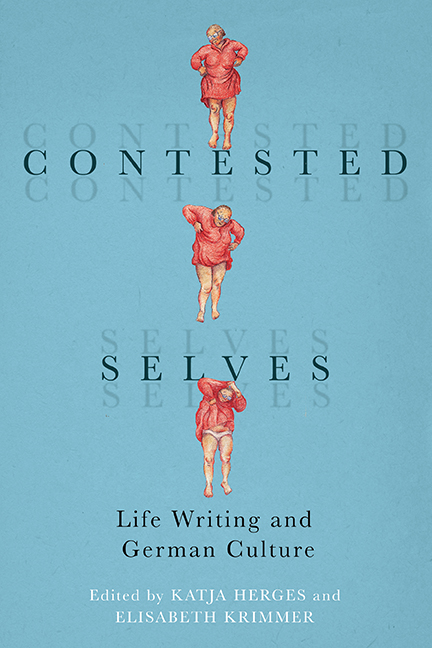Book contents
- Frontmatter
- Contents
- Acknowledgments
- Introduction
- Part I Women’s Life Writing, Female Subjectivity and Agency
- Part II Modern Life Writing and Aesthetics
- Part III Trauma and Vergangenheitsbewältigung
- Part IV Transnational and Transgenerational Life Writing in Contemporary Germany
- Bibliography
- Notes on the Contributors
- Index
9 - The Case of the Disappearing Son: Gender, Genre, and German Postwar Cultural Memory in Niklas Frank’s Meine deutsche Mutter and F. C. Delius’s Bildnis der Mutter als junge Frau
Published online by Cambridge University Press: 26 May 2022
- Frontmatter
- Contents
- Acknowledgments
- Introduction
- Part I Women’s Life Writing, Female Subjectivity and Agency
- Part II Modern Life Writing and Aesthetics
- Part III Trauma and Vergangenheitsbewältigung
- Part IV Transnational and Transgenerational Life Writing in Contemporary Germany
- Bibliography
- Notes on the Contributors
- Index
Summary
WHAT PROMPTS AN AUTHOR to announce that he is writing a book about his mother and then all but erase himself from the story of her life? Peter Handke's 1972 Wunschloses Unglück (Perfect Unhappiness; in English as A Sorrow beyond Dreams, 1974) begins with its first-person narrator reporting on his reaction to his mother's suicide and his decision to write about her life. The ensuing narrative includes accounts of his own relationship to her at different points; Handke also interrupts his story several times to reflect on the difficulties of writing it and ends with his resolution to return to it later. In the middle of the book, however, while recounting his mother's experiences during and immediately after World War II, he detaches himself suddenly from her story. The “I” vanishes, replaced by “the child.” Writing of her flight from Berlin's bombings to her family home in provincial Austria, he reports that she “drückte das Kind an sich, dass es weinte” (Wunschloses Unglück, 29; “squeezed her child so hard that it cried”; A Sorrow, 19). Relating her decision to remain in a loveless marriage after the war, he explains, “Sie hatte das Kind mitgebracht, und lustlos befolgten beide das Pflichtprinzip” (Wunschloses Unglück, 31; “She had her child with her, and without enthusiasm they both took the path of duty”; A Sorrow, 21). Despite his extensive metanarrative reflection elsewhere, the narrator does not comment on this shift. Based on what he reveals about himself and his relationship with his mother in other places in the text, the reader can only posit reasons for his self-erasure: that he feels responsible for her marriage with an abusive alcoholic husband, perhaps, or that he wants to focus attention on his mother's experience or to shield himself from her suffering.
Thirty years later, two other books offer far less material that could explain the son's curious absence from his mother's story. Niklas Frank's 2005 Meine deutsche Mutter (My German Mother) and Friedrich Christian Delius's 2006 Bildnis der Mutter als junge Frau (Portrait of the Mother as a Young Woman, 2010) efface the authors’ presence almost entirely: Frank appears only in his book's prologue, and Delius is not yet born during the imagined episode from his mother's life that he relates.
- Type
- Chapter
- Information
- Contested SelvesLife Writing and German Culture, pp. 191 - 204Publisher: Boydell & BrewerPrint publication year: 2021



